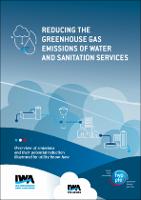Reducing the Greenhouse Gas Emissions of Water and Sanitation Services
Overview of emissions and their potential reduction illustrated by utility know-how
Contributor(s)
Alix, Alexandre (editor)
Bellet, Laurent (editor)
Trommsdorff, Corinne (editor)
Audureau, Iris (editor)
Language
EnglishAbstract
The scientific evidence contained in the three volumes of the 6th IPCC report (AR6), published between August 2021 and April 2022, are another reminder of the urgent need to respect the 2015 Paris Agreement. 195 countries agreed to the goal of limiting long-term global temperature increase to “well below 2°C” compared to pre-industrial levels and to pursue efforts to limit the increase to 1.5°C by massively reducing their emissions of carbon dioxide and other greenhouse gases (GHGs).
Water and climate questions are usually addressed from the perspective of adaptation to climate change. For urban water services the mitigation aspect has been less studied up till now. These considerations fit into the broader context of the interdependence of energy and water (Water-Energy Nexus). This report approaches the question from the angle of energy use in the water sector rather than the better-known water requirements for the energy sector. Reducing GHG emissions in urban water management requires reducing both fossil energy requirements and direct emissions of nitrous oxide and methane. Finally, it must be said that the need to reduce the GHG emissions of water and sanitation services goes with the growing demand for water. It should increase by 50% between now and 2030 worldwide due to the combined effects of population growth, economic development, and the shift in consumer patterns.
This synthetic report aims to provide an overview of possible levers to reduce the greenhouse gas emissions of water and sanitation services and provides an analysis of how adaptation measures can embrace this low-carbon approach.
Keywords
SCIENCE / Environmental ScienceDOI
10.2166/9781789063172ISBN
9781789063165, 9781789063172Publisher
IWA PublishingPublisher website
https://www.iwapublishing.com/Publication date and place
2022Classification
Environmental science, engineering and technology


 Download
Download Web Shop
Web Shop